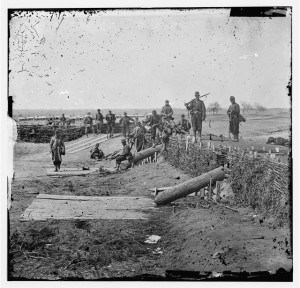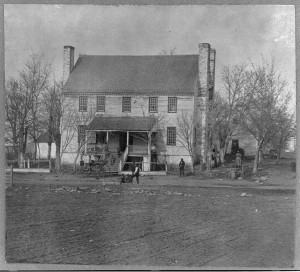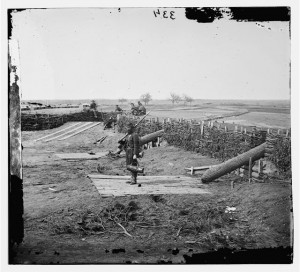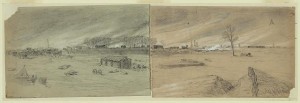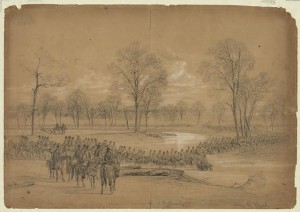Civil War Daily Gazette has been doing a great job keeping us up-to-date on the Confederate retreat in Virginia. Here’s a bit from a northern newspaper.
From The New-York Times March 13, 1862:
NEWS FROM MANASSAS; Reports of Our Correspondent with the advance of the Army. The Rebel Evacuation Commenced on Friday Last. THE PANIC AMONG THE REAR GUARD. The Rebels at Winchester Now Said to Have Escaped. Great Strength of the Rebel Fortifications. Concentration of the Rebel Army at Gordonsville.
WASHINGTON, Wednesday, March 12.
A courier from the Union troops in the direction of Brentsville, Va., brings reports to 5 P.M. yesterday. Up to that time they had sustained Their difficult march with much fortitude, and but few lagged behind. All are much disappointed at the flight of the rebels. The smoke of burning property near Manassas can be plainly seen from camp.
The roads in many places are very bad.
Contrabands coming into our lines report that officers commanding the twelve months “Confederate” troops advised their men to disband and repair to their homes.
Great columns of smoke seen in the direction of Brentsville, indicated the abandonment and destruction of the enemy’s works.
A correspondent of the TIMES, who accompanied the advance upon Centreville and Manassas has just come in. He was in every fort at Centreville, and went with the first column that crossed the Bull Run battle-field and entered the famous stronghold, Manassas. He corrects many previous statements we have had of the evacuation of those places by the enemy.
It was only last Friday that the retreat of the rebels from Centreville commenced. Gen. JOHNSTON left on Friday morning; Gen. SMITH left on Saturday afternoon, and Col. STUART last Monday, the day our army left camp on the Potomac.
The retreat was conducted very orderly at first. Everything was carefully cleaned up at Centreville — nothing left that could be useful to us. The forts were well planned and very formidable. They command the roads, and the fire of not less than a hundred guns could be converged upon any approach to the defences; but the guns were never brought from Manassas to mount the Centreville forts. A railroad track extended from Manassas to Centreville, and a telegraph line. The rebel Generals had their headquarters at Centreville all together, and a more convenient and complete military establishment could not be found in Washington than they had.
Through Manassas the enemy continued their retreat as quietly as it began. They carried off all their heavy guns from Manassas — forty to sixty in number — part their army marching by turnpike to Warrenton, and part to Gordonsville, where it was said they would make a stand.
It was on Monday evening that the first sign of panic was noticed at Manassas. A part of STUART’s rear column was preparing a train to move Southward by railroad, when they learned some excited rebels had set fire to the bridges ahead of them. They immediately began to burn, destroy, and run away in general confusion. Five hundred barrels of flour, piled up in ranks, had their heads stove in. Barrels of molasses suffered the same way, with more loss to the commodity; and a hundred and sixty barrels or kegs of powder were left which they did not well know how to destroy in safety to themselves.
It seems to be confirmed that the enemy had, two weeks since, between fifty and sixty thousand troops at Centreville and Manassas, and that they only began their retreat last Friday. Why they went is a mystery; as the number of men, in the fortifications they had prepared, would have been equal to three times their force assailing them from without. They must have feared to trust their men whose enlistments were expiring, or their powder, which many accounts agree is of very inferior quality.
But the strangest news brought by the TIMES correspondent is that Gen. JACKSON and one-half his army, whom Gen. BANKS yesterday supposed he was closely watching in Winchester, went down the railroad to Manassas one week ago, and quietly marched off southward. The other half are said to be moving southward in the valley of the Shenandoah.
Reconnoissances beyond Manassas show that all the damage possible to be done in a brief time has been done to the railroad that took the rebels off. The last of the rebels left Manassas on Monday evening. On Monday night our scouts approached the place. On Tuesday, about 1 o’clock, P.M., the correspondent of the TIMES, attended by a detachment of Union troops, entered the works. …

